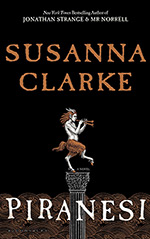
![]() Bormgans
Bormgans
12/20/2020
![]()
(...)
Thematically Clarke uses old, familiar tropes, but she manages to infuse them with new life. Maybe the most breathtaking reversal was how she made the real world serve as mythic prophecy, and as such Clarke has written a very, very successful epistemic novel. Piransi shows perspective is always key when judging knowledge.
Clarke seems to inscribe herself into the Romantic tradition that longs for a past where humanity - before the advent of "progress" and Science - possessed "Great and Secret Knowledge". A tradition that sees the innocence of a child as superior to "the iron hand of modern rationality". The core of the novel's world building confirms this. There would not be a House if Clarke didn't acknowledge these sentiments. Ideologically I don't see eye to eye with Clarke on this matter: while the Enlightenment of the 18th century undoubtedly altered our world, and the results of its technologies now even threaten it, I don't think most people would want to return to the state before penicillin, fridges and smartphones. That past might seem appealing to lovers of the arcane, but people tend to forget we used to burn witches.
Clarke also makes the categorical mistake to uphold the illusion that "rivers and mountains" don't give us wisdom anymore. All we know today, we know because of observation of and dialogue with reality. More so: it is the essence of science. It is a falsehood we "ceased to speak and listen to the World." On the contrary: much of the trouble we are in today could be remedied is we would only listen better to science's listening.
(...)
Full review on Weighing A Pig Doesn't Fatten It
https://schicksalgemeinschaft.wordpress.com/2020/12/20/piranesi-susanna-clarke-2020/